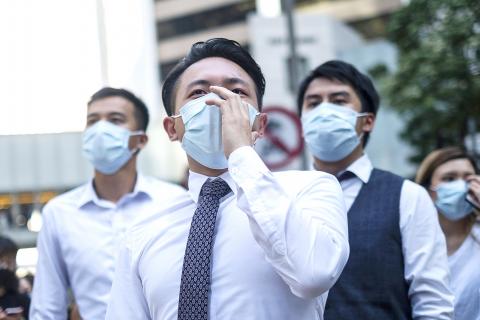Hong Kong invoked emergency powers for the first time in more than half a century to ban face masks for protesters after months of unrest, prompting demonstrators to occupy downtown streets.
Hong Kong Chief Executive Carrie Lam (林鄭月娥) yesterday said the move was necessary to stem increased violence in recent weeks, including attacks by protesters using petrol bombs, corrosive liquids and other weapons.
The prohibition on face masks would deter violence and help police to enforce the law, she said, adding that the measure did not mean Hong Kong was under a state of emergency.

Photo: Bloomberg
As Lam spoke, protesters began gathering in Hong Kong’s Central district and occupying major boulevards.
Shops closed early in anticipation that demonstrations would grow violent, similar to clashes between police and protesters in the past few weeks.
“The violence is destroying Hong Kong,” Lam told reporters, flanked by 16 members of her cabinet. “We must save the present Hong Kong and the future Hong Kong.”
Lam called the situation “fluid” and said the government might consider additional measures if the situation worsened.
“I don’t see how you could relate this to a step closer to authoritarianism,” Lam said in response to a question. “This is a responsible act to deal with an extremely difficult situation, which I hope the world has sympathy.”
The face mask has become a symbol of resistance among protesters who fear retribution if they are identified: China has applied pressure to businesses such as Cathay Pacific Airways Ltd (國泰航空) to fire employees who participate in demonstrations.
The Civil Human Rights Front, which has organized some of the largest protests in the past few months, called the mask ban “dictatorship rule” and said “unspeakable consequences will follow.”
“This is like opening a Pandora’s box — who knows what will come next after this ban?” said one man protesting in central Hong Kong, who only gave his surname Lau. “But the government should know that if it insists, and doesn’t listen to the people, we won’t give up and will keep the government accountable. We will continue our fight.”
The emergency law, first passed by the British government nearly a century ago to quell a seamen’s strike in Hong Kong’s harbor, was last used by the colonial administration to put down riots in 1967.
Denounced by protest leaders, it could give the government greater leeway to arrest citizens, censor publications, shut off communications networks and search premises without warrants, among other measures.
“Put simply, if there’s no escalation of violence, we don’t need to come out with any new measures, but if violence escalates, we need to maintain law and order in Hong Kong, we need to make sure that people can conduct their lives as usual,” Lam said.

CALL FOR SUPPORT: President William Lai called on lawmakers across party lines to ensure the livelihood of Taiwanese and that national security is protected President William Lai (賴清德) yesterday called for bipartisan support for Taiwan’s investment in self-defense capabilities at the christening and launch of two coast guard vessels at CSBC Corp, Taiwan’s (台灣國際造船) shipyard in Kaohsiung. The Taipei (台北) is the fourth and final ship of the Chiayi-class offshore patrol vessels, and the Siraya (西拉雅) is the Coast Guard Administration’s (CGA) first-ever ocean patrol vessel, the government said. The Taipei is the fourth and final ship of the Chiayi-class offshore patrol vessels with a displacement of about 4,000 tonnes, Lai said. This ship class was ordered as a result of former president Tsai Ing-wen’s (蔡英文) 2018

‘SECRETS’: While saying China would not attack during his presidency, Donald Trump declined to say how Washington would respond if Beijing were to take military action US President Donald Trump said that China would not take military action against Taiwan while he is president, as the Chinese leaders “know the consequences.” Trump made the statement during an interview on CBS’ 60 Minutes program that aired on Sunday, a few days after his meeting with Chinese President Xi Jinping (習近平) in South Korea. “He [Xi] has openly said, and his people have openly said at meetings, ‘we would never do anything while President Trump is president,’ because they know the consequences,” Trump said in the interview. However, he repeatedly declined to say exactly how Washington would respond in

WARFARE: All sectors of society should recognize, unite, and collectively resist and condemn Beijing’s cross-border suppression, MAC Minister Chiu Chui-cheng said The number of Taiwanese detained because of legal affairs by Chinese authorities has tripled this year, as Beijing intensified its intimidation and division of Taiwanese by combining lawfare and cognitive warfare, the Mainland Affairs Council (MAC) said yesterday. MAC Minister Chiu Chui-cheng (邱垂正) made the statement in response to questions by Democratic Progressive Party (DPP) Legislator Puma Shen (沈柏洋) about the government’s response to counter Chinese public opinion warfare, lawfare and psychological warfare. Shen said he is also being investigated by China for promoting “Taiwanese independence.” He was referring to a report published on Tuesday last week by China’s state-run Xinhua news agency,

‘NOT SUBORDINATE’: Only Taiwanese can decide the nation’s future, and people preserving their democratic way of life is not a provocation, President William Lai said Taiwan does not want China’s “one country, two systems,” and must uphold its freedom and democracy as well as resolve to defend itself, President William Lai (賴清德) said yesterday, rejecting Beijing’s latest bid to bring the country under Chinese control. The president made the remarks while attending a commissioning ceremony for Taiwan’s first battalion of M1A2T Abrams tanks in Hsinchu County’s Hukou Township (湖口). The tanks are made by General Dynamics, a major US defense contractor. China this week said it “absolutely will not” rule out using force over Taiwan, striking a much tougher tone than a series of articles in state media